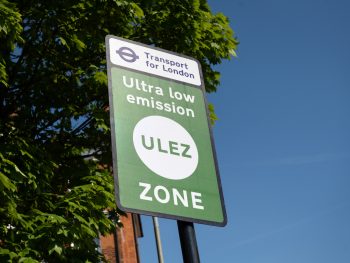A consultation on plans to expand the Ultra Low Emission Zone (ULEZ) to cover almost the whole of the capital from 29 August 2023 has opened.

It comes three months after the Mayor of London said he would ask Transport for London (TfL) to consult on the plans to make the capital greener and less congested.
The expansion of the scheme would follow overwhelming evidence showing further bold measures are required to reduce toxic air pollution, tackle the climate emergency and cut congestion in the capital.
Recently published analysis by City Hall revealed that, despite recent improvements in air quality, every hospital, medical centre and care home across the capital is located in areas that breach latest World Health Organization’s guidelines for nitrogen dioxide and particulate matter.
Meanwhile, a report from the UN’s Intergovernmental Panel on Climate Change (IPCC) in February 2022 warned there is only a brief and rapidly closing window to tackle the climate crisis, with a warning of the dire consequences of inaction.
And traffic congestion continues to be a persistent problem in the capital. Last year, the cost to the London economy was estimated to be £5.1bn. Nearly two-thirds of the cost of congestion in London has been attributed to traffic delays in outer London.
Earlier this year, a new report commissioned by the Mayor found that ‘bold action’ including expansion of the ULEZ scheme and the use of road user pricing in the longer term were much needed to cut congestion and emissions.
The analysis revealed that expanding the ULEZ London-wide short term would have the biggest effect on emissions relative to the cost to Londoners as a whole, as well as helping to tackle the climate emergency and traffic congestion.
The current £12.50 daily charge level for cars, vans and motorbikes that do not meet the standards would be retained. This would be supported by a revision of the Mayor’s Transport Strategy, which is also part of this consultation. The consultation will also ask Londoners to help shape the future of road user charging in the capital. This could include scrapping existing charges, such as the Congestion Charge, and replacing them with a single road user charging scheme.
If a larger zone were introduced, it would have a significant impact by the end of 2023. It is estimated that the number of cars not meeting the tough ULEZ standards each day in outer London would fall from 160,000 to 46,000 and the number of vans from 42,000 to 26,000.
The consultation also proposes “as big a vehicle scrappage scheme as is feasible” to help people adapt to the change if the proposals are confirmed by the mayor. This would build on the Mayor’s previous £61m scheme, which took more than 15,000 vehicles off the road.
TfL is also proposing to make it easier for people to pay the charge by removing the annual £10 per vehicle Auto Pay registration fee, while ensuring financial penalties for non-payment remain an effective deterrent by increasing the penalty by £20, or £10 if paid within 14 days.
Alex Williams, TfL’s director of city planning, said: “It’s clear that the capital’s toxic air is continuing to blight the lives of Londoners and progress in outer boroughs is slower than anywhere else. The number of premature deaths and current projections for diseases linked to poor air quality is unacceptable. We must act at pace to tackle this, which is why we are proposing to expand the ULEZ London-wide next year and are looking at the longer-term solution of a new form of road user charging. We would encourage people to respond to this consultation to help shape our plans.”
However, in its response to the plans, the AA warned of the impact on low-income residents and said better options to tackle emissions were available.
While the consultation admits that 18% of vehicles will be hit by the charges, the AA says information released by TfL points to a 34% impact on London car owners in some areas.
“The original ULEZ impacted on 300,000 car-owning London residents, the vast majority coming from low-income backgrounds without the ability to afford a replacement vehicle. This expansion of the zone will price hundreds of thousands more off the road,” said Jack Cousens, the AA’s head of roads policy.
“These drivers and their families will, hopefully, be starting to recover from the cost of living crisis in August of next year. The London Mayor wants to hit them with a charge or a car-replacement cost that they will never be able to afford.
“The AA believes that far more can be done in lowering London’s emissions by an expansion of Park & Ride and Park & Cycle facilities on the city’s outskirts. That benefit would remove the emissions from huge numbers of cars (Cambridge converts 3.6 million inner-city car journeys into bus trips this way each year) long after the ULEZ becomes defunct.
“With pump prices so high, it calculates that there is little difference in cost to driving from outside into inner London than taking public transport. By train or underground, the journey time is halved, which makes park and ride a no-brainer.”
To access the consultation, click here.

